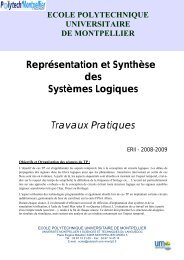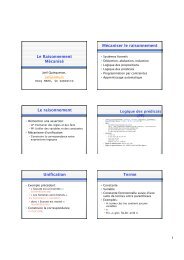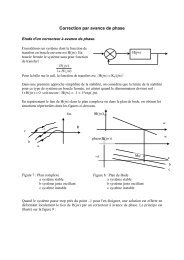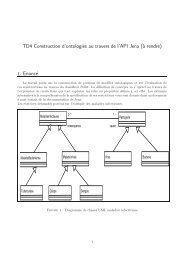Evaluating User Experience in Games: Concepts and Methods - Lirmm
Evaluating User Experience in Games: Concepts and Methods - Lirmm
Evaluating User Experience in Games: Concepts and Methods - Lirmm
You also want an ePaper? Increase the reach of your titles
YUMPU automatically turns print PDFs into web optimized ePapers that Google loves.
Chapter 9<br />
Digital <strong>Games</strong>, the Aftermath: Qualitative<br />
Insights <strong>in</strong>to Postgame <strong>Experience</strong>s<br />
Karolien Poels, Wijn<strong>and</strong> IJsselsteijn, Yvonne de Kort, <strong>and</strong> Bart Van Iersel<br />
Abstract To date, most research on user experiences <strong>in</strong> digital games has focused<br />
on what happens dur<strong>in</strong>g game play. In this chapter, we conceptualize the phenomenon<br />
of postgame experiences, that is, experiences gamers have once they<br />
stopped play<strong>in</strong>g. We propose <strong>and</strong> tackle two types of postgame experiences: shortterm<br />
postgame experiences that arise immediately after game play <strong>and</strong> long-term<br />
postgame experiences that occur after repeatedly <strong>and</strong> <strong>in</strong>tensively play<strong>in</strong>g a particular<br />
game or game genre. We present two focus group studies that offered qualitative<br />
<strong>in</strong>sights <strong>in</strong>to which postgame experiences are at play, to what extent, <strong>and</strong> under<br />
which conditions. The chapter concludes with a discussion <strong>and</strong> recommendations<br />
for future research.<br />
9.1 Introduction<br />
Everybody who has ever played a digital game or has watched other people play<br />
will undoubtedly agree that digital games have the potential to trigger a wide variety<br />
of experiences <strong>and</strong> emotions. Examples are the joy or pride when you beat your<br />
friend <strong>in</strong> a game of virtual tennis, the suspense you feel when fight<strong>in</strong>g <strong>in</strong> a First<br />
Person Shooter Game, or the experience of be<strong>in</strong>g immersed <strong>in</strong> the story of a Role<br />
Play<strong>in</strong>g Game. These <strong>in</strong>-game experiences are mostly the focus of studies on user<br />
experiences <strong>in</strong> games (Brown <strong>and</strong> Cairns 2004, Ermi <strong>and</strong> Mäyrä 2005, Jennet et al.<br />
2008). However, it is reasonable to ask whether game-related player experiences do<br />
occur only while gam<strong>in</strong>g <strong>and</strong> consequently stop when the player turns off the gam<strong>in</strong>g<br />
device? Or whether they l<strong>in</strong>ger <strong>and</strong> even transfer <strong>in</strong>to real life? And what k<strong>in</strong>d<br />
of experiences occur once the player has stopped gam<strong>in</strong>g? These are all important<br />
questions when conceptualiz<strong>in</strong>g <strong>and</strong> evaluat<strong>in</strong>g the full picture of user experience<br />
K. Poels (B)<br />
MIOS Research Group, Department of Communication Studies,<br />
University of Antwerp, Belgium<br />
e-mail: karolien.poels@ua.ac.be<br />
R. Bernhaupt (ed.), <strong>Evaluat<strong>in</strong>g</strong> <strong>User</strong> <strong>Experience</strong> <strong>in</strong> <strong>Games</strong>, Human-Computer<br />
Interaction Series, DOI 10.1007/978-1-84882-963-3_9,<br />
C○ Spr<strong>in</strong>ger-Verlag London Limited 2010<br />
149

















